
ENVIRONMENTAL SCIENCE LAB (ENVS 31L) -- City College of San Francisco
INSTRUCTORS: Katryn Wiese *|* Eliza Woo *|* Hitesh Soneji
(Zero Cost for lab materials/manual)
**FALL 2023: ENVS 31L -- Hybrid – CRN: 73056 – Meets in person in Science 45 -- Fridays -- 2:10 to 5 pm
**To enroll in this class, you must have already completed or be concurrently enrolled in the lecture course.
Fall 2023: lecture will be taught by another instructor. See CCSF Schedule for more details.**
Want to add the class? Review add policies
In this course we will cover a range of environmental science topics and skills, including human impacts on the environment in lab and/or field settings and application of qualitative and quantitative concepts and models to evaluate environmental problems and their proposed solutions. (ENVS 31L Official Course Outline)
Upon completion of this course a student will be able to:
- Observe patterns, formulate questions, develop hypotheses and design methods of study relating to environmental problems and processes.
- Collect data using a variety of laboratory and field tools and techniques and observing safety precautions.
- Analyze and interpret biological, chemical, and physical indicators of environmental change and effectively communicate findings.
- Apply qualitative and quantitative concepts and models to evaluate human impacts on the environment on a variety of scales.
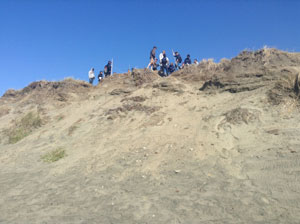
As your instructors, we are committed to finding the most effective ways to engage you with the material and help you to learn. The class formats and teaching methodologies are all designed to help you build your understanding of the material and kick it around and ask questions of us and your fellow students so you can strengthen it.
Through reading material, which you access at your own pace, you will begin the process each week of learning the new material. During the lab, you will refine and strengthen that understanding as you explore the lab topic and materials.
Learning the material is ultimately up to you and how much time and effort you put in (preparation and practice). We will help and guide you, but we can't simply make you learn. If you're struggling, reach out. We want to help. Welcome!
Class time commitment:
- On average, 4.5 hours/week of work. 3 in person and the rest online
- Field trips will take place during the semester -- see class syllabus for schedule
Prerequisites:
- Required: that you have completed or be co-enrolled in the Environmental Science lecture.
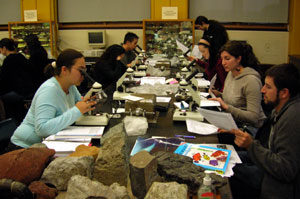
IS THIS THE RIGHT COURSE FOR YOU?
Let's review some of the basic logistics of this course, and then you'll know whether you're ready for a General-Education science laboratory.
- Is this your first science course? Student with the best chance of success in this class are those with a strong background in math and English (it is advised that you have completed Algebra 2 and Geometry and have completed or be co-enrolled in college-level English).
- Are you comfortable with technology? During this semester, you will need:
- Solid internet connection and access to YouTube (any browser, most devices) to access tutorials.
- A camera (phone camera works fine!), so you can upload photos of some of your work.
- Google Mail, Docs, and Photos so you can share photos with your fellow students.
- CANVAS to complete assignments and take some quizzes/exams.
- Do you have enough time in your schedule? The weekly workload for this class is, on average, 4.25 hours per week for 16 weeks, broken down, generally as follows:
- Completing the preparatory lab reading (~1 hr/week)
- Completing the labs. (~3 hr/week)
- Other miscellaneous activities like accessing additional review resources (textbook and web resources), and communicating with other students and instructors.
General Education science laboratories are not easy. They really do require consistent effort. Your best chance of success is to have positive and regular engagement with your instructors and your fellow students in class and to keep on task (meeting deadlines and keeping up each week). As your instructors, we will do our best to provide you these opportunities. It will be up to you to step up and engage! We look forward to meeting all of you and having you meet each other.
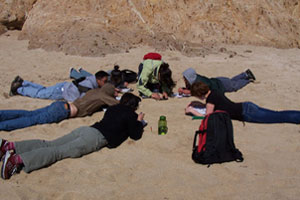
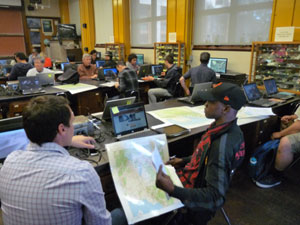
QUESTIONS?
If you have any questions or concerns regarding class format or content, remember your resources are CANVAS, the labs, your instructors, and each other.
- CCSFMail (student Google Mail accounts) instructions and access to many CCSF technology services can be found at MyCCSF.
If you have forgotten your password, log into your myRAM account and find the CCSF Mail password reset under your profile. - CANVAS: You are welcome to login early to view the class in CANVAS (available only if you are registered and only after college loads classes a few weeks before semester starts). However, you cannot upload assignments in CANVAS until the first official day class starts.
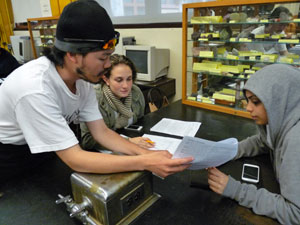
Other Support Services:
- Disabled Students Programs/Services (DSPS) -- Rosenberg Library, Room 323, on the Ocean Campus. Telephone: 415-452-5481 (V) 415-452-5451 (TDD) -- DSPS is the campus office responsible for verifying disability-related need for academic accommodations, assessing that need, and planning accommodations in cooperation with students and instructors as needed and consistent with course requirements. Students who need academic accommodations should request them from the DSPS.
- Counseling Department (Note: Counselor Anastasia Fiandaca is a good counseling resource if you aren't already working with a good counselor. She is especially experienced with environmental courses and programs and this class in particular. Phone: 415-239-3824)
- Learning Assistance Resource Center -- R207 -- 415.452.5502
READY TO GET STARTED?
If you are registered, then sign in to CANVAS for Week 1 details and requirements. The class will be available at least a week before the semester starts.